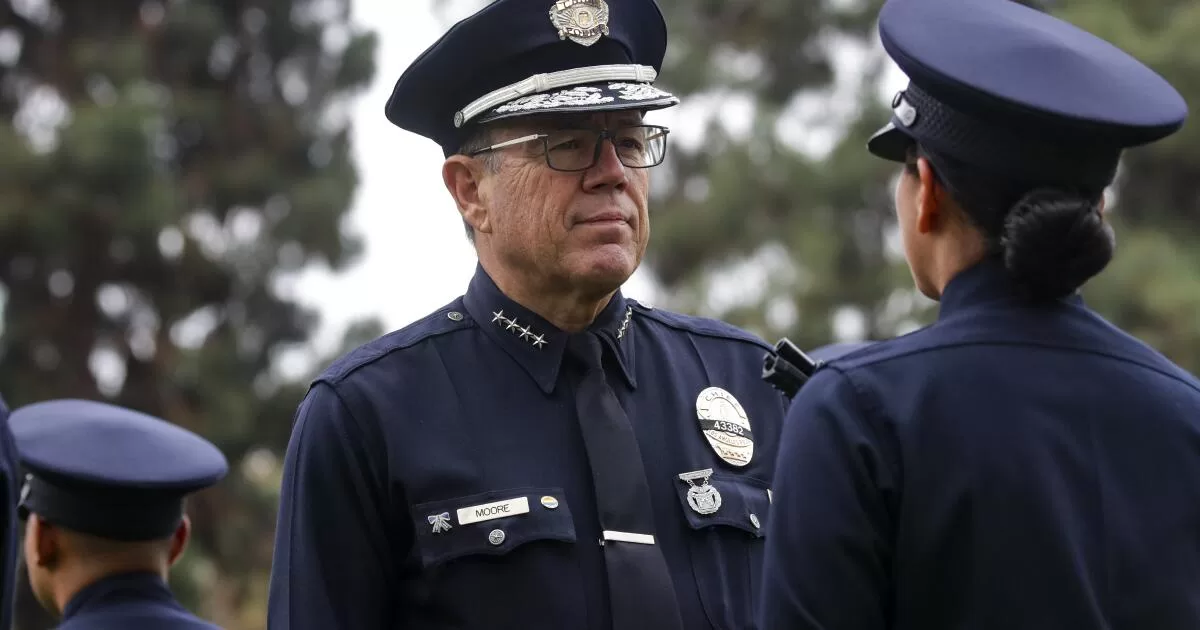Depending on whom you ask, an interim police chief is either a simple placeholder to keep things moving during the search for a permanent replacement, or the person is a strategic partner who will help Mayor Karen Bass figure out what kind of chief the department needs to serve one of the biggest, most diverse cities in the country.
Connie Rice, who served on former President Obama’s Task Force on 21st Century Policing, said an interim chief’s job is to give the mayor “a state of the department CAT scan,” a deep assessment of “what are the priorities for hitting reset, identifying areas where there’s been progress made, slippage, areas for repair.”
If a police department is “too top-heavy” or is filled with people ready to retire, Rice said, a new permanent chief would need the skills to build an agency from the ground up. If crime has moved online, the new chief would need sophisticated cyber skills.
“My inkling right now,” Rice said in an interview, is that the department needs an interim chief “who is fluent in the LAPD. … You don’t want somebody who needs to know where the bathrooms are.”
On the other hand, Rice said, “you don’t want someone internal.”
Former police commissioner Steve Soboroff would add at least one more requirement: “I think the goal would be to have the interim be as interim as possible” and not hope to vie for the top job. It should be a rule, he said, “that whoever becomes the interim chief will not be the chief of police.”
Friday’s nearly four-hour meeting was the first time the commission has met in closed session to discuss the interim chief’s selection, said Richard Tefank, the board’s executive director, although “there’s been some staff work done on it.”
The goal, Tefank said, “is to have the interim in place before Chief Moore leaves, and then work on the permanent replacement.”
Moore and Bass announced earlier this month that he would step down at the end of February, after 5 1/2 years on the job.
Moore was reappointed a year ago to serve a second five-year term and planned to serve for two or three years. Moore’s idea was that he would hand the job over to a new chief ahead of the 2028 Olympic Games.
But his tenure has been marked with controversy, and he announced his resignation on Jan. 12.
“I know I’ve made mistakes and missteps,” Moore said at the time. “But I’m also confident that my work has seen success across a broad spectrum of topics unmatched by any other law enforcement agency in this country.”
Moore said the department has become more diverse under his watch. Recent LAPD data show crime is on a downward trend.
At the same time, the department has faced several scandals which have tainted his time as top cop.
An assistant chief allegedly tracked an officer with whom he was romantically involved, for example, and gang-unit officers have been suspected of thefts and illegal stops.
Brief public comment before the police commission went into closed session Friday ranged from civil but critical to profane and unprintable.
Over about five minutes, four men took aim at Moore, the police commission, the process of picking an interim chief, and Black women in leadership positions.
One commenter asked God to bless the outgoing chief, another wished Moore “good riddance.”
“We’re going into a new phase,” said Steve Rogers, who regularly attends commission meetings. “I do hope that you select a future chief that will implement community policing, that will make the department more accessible with outreach on the website, letting people know when meetings occur in the community.”
Activist Philip Tabbi was more direct — and disparaging.
“For the past several years, as Moore served as chief of police, we all learned exactly what we do not want in the leader of the greatest police department in the nation,” he told the commissioners.
“We do not want a chief who will continue to make poor decisions that make our communities unsafe. Mike has done serious damage, severed community ties and has no remorse.“
Friday’s meeting ended with no announcements. Tefank said the session “was about process and about candidates and about going forward.” The selection will be on the commission’s agenda again Tuesday.
According to the city charter, Tefank said, the commission appoints the interim chief, but “for the permanent selection, the commission works with the general manager of the [LAPD] personnel department and identifies candidates. At the end, they will submit candidates to the mayor ranked in numerical order, 1, 2, 3. Then the mayor makes her selection.”
That, however, is down the road. First, the commission will find a stand in, which could happen “within the next few weeks,” he said. The two selections will be “on different tracks” with the search for an interim chief “the more urgent one,” he said.
